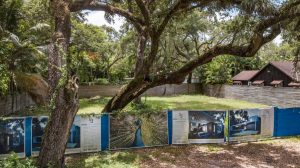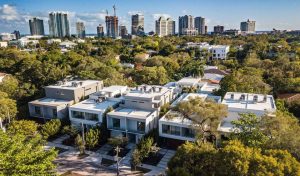New million-dollar houses were supposed to be built on a dozen prime lots in Coconut Grove.
But a real estate developer accused of fraud — and broke, according to his lawyer — never fulfilled his promises to eager buyers who gave him huge deposits, and the properties are likely to be auctioned off to the highest bidder.
Receiver Alan Fine, appointed to manage the maze of the case against self-styled “King of Coconut Grove” Doug Cox, his domestic partner Nicole Pearl and their companies, has asked Miami-Dade Circuit Court Judge Jennifer Bailey to approve the sale of the undeveloped lots.

Eight of the lots are still under contract to buyers, some of whom have waited years for their houses to be built as completion dates came and went and nothing happened on the properties. Cox hadn’t even pulled building permits on them. Four of the properties have old houses on them slated for demolition. The others are empty, aside from overgrown vegetation.
Sale prices in the Grove have doubled since 2020 — and mortgage rates have tripled — as the Miami housing market boomed during the COVID influx of new residents. Original buyers say they can’t afford today’s prices and want their contracts honored.
But one of Fine’s duties is to “maximize the assets and minimize the liabilities” of Cox’s companies, and so he has decided to start the “process of marketing the lots for a bulk sale” at current market value.
Cox has also signed purchase contracts for 12 nearly finished townhouses on Coconut Avenue in the Grove but has not allowed buyers to complete the sales and move in; those properties are also under the control of Fine, whom Bailey appointed as receiver in May.
Bidder Steps Up
Fine already has a buyer who is offering $16.5 million for the 12 undeveloped lots: Red Treehouse LLC, a company formed two weeks ago in Wyoming by Phillip Sylvester, a Chicago-based real estate investor and Cox’s business partner in home-building since 2014. He first hired Cox as a general contractor on a few houses.
Sylvester is suing Cox, claiming he, too, was deceived by Cox, who gave him fake mortgage documents in 2019, broke their agreement and owes him $7 million, Sylvester says.
Sylvester said he discovered what Cox was doing when he read a March article in the Miami Herald, confronted Cox, and then, fearing Cox was pocketing the money, “depleting and wasting” the properties and driving the development companies to bankruptcy in a “fraudulent scheme,” filed the emergency request for a receiver to take over management.
Fine said Sylvester’s offer qualifies him as the “stalking horse” or first bidder. If no one out-bids him, he buys the properties he initially bought and agreed to develop in a joint venture with Cox five years ago.
“This would be the second time I’m buying these properties. I’m offering $16.5 million and I paid $9 million the first time,” Sylvester said. “My motivation is to reclaim my properties and move the receivership investigation along. This agreement to be stalking horse required a lot of complicated work and relinquishing my property rights, but I feel if I didn’t step up the hemorrhaging would continue.
“I don’t know what happens next, but we want to get to the bottom of this and make things right.” Fine told Bailey in his motion that the sale of the lots to Sylvester “as a ‘stalking horse’ and an auction governed by the procedures proposed herein will enable the receiver to obtain the highest and best offer for the lots.”
Among those holding contracts on the lots are Rafael Isola and Maria Del Mar Velez, who sued Cox and Pearl on April 24, alleging “breach of contract, deceptive and unfair trade practices and fraud” stemming from their March 2022 purchase contract for a beautiful oak-shaded vacant lot and house to be constructed in the North Grove at 2050 Secoffee St. for $4.85 million with a deposit of $1.456 million. The couple included in the suit a copy of a bounced check from Cox that was to be a partial refund of their deposit.

What does Fine’s goal for the undeveloped lots portend for the dozen additional Cox properties that have had nearly finished townhouses sitting on them for at least two years? It’s unclear.
The townhouses are all under contract with buyers, some under double and even triple contracts. The 4,000-square-foot townhouses initially went under contract for $1.2 million to $1.8 million, with deposits ranging from $300,000 to $550,000.
Cox and Pearl are accused in court records of stalling buyers and preventing them from moving in by not completing final inspections and obtaining certificates of occupancy while they resold the houses at higher prices and collected larger deposits from subsequent unsuspecting buyers.
Cox has declined to respond to Herald queries. He’s blamed delays on supply-chain problems, the city of Miami’s building department and the engineer he hired to do inspections.
Fine estimates Cox and Pearl collected $22 million in deposits over five years, including $3.3 million from four buyers on a single townhouse at 2960 Coconut Ave. Three people have contracts on it now, including one for $2.475 million with a $742,500 deposit from February 2022 and one for $2.375 million with a $1.52 million deposit from January, according to lawsuits. The third one, amount unspecified, was signed in December, according to court records.
All the while, buyers say Cox and Pearl persuasively assured them they were close to completing the final touches, stringing some along as they put down their life’s savings, moved their families to Miami from New York, Chicago and California, placed their belongings in storage and lived with relatives or rented apartments — at skyrocketing rental rates — in anticipation of moving into their dream homes within 60 days. Some of the original buyers walked through the townhouses in 2020 and 2021 and assumed that since the homes were only lacking a mirror here or a fixture there that they would close in a matter of weeks.
Instead, Cox put up “No Trespassing” signs and security cameras and forbade them from stepping onto the properties. Cox, a developer in one of the hottest markets in the country, has not closed a home sale since 2019.
“I have yet to see any substantial, conscientious attempt to honor the legally binding contracts of the buyers,” said Michael Coyne, who bought one of the Coconut Avenue townhouses for $1.6 million in 2021 and put down a $487,500 deposit. He, his wife, their three children and her parents have lived like vagabonds in nine places since. “We’re hoping for a fair outcome. We hope the judge and receiver are working on behalf of the wronged victims who have suffered an injustice and severe financial harm as a result of fraud. I am ready to finish buying my house right now without a certificate of occupancy. We believe the original buyers deserve that opportunity.”
$20 Million Not Accounted For
The estimated value of all the Cox properties — the lots and houses — is $65 million to $69 million. The claims of buyers, investors, Sylvester and a lender that is charging 24.5 percent interest add up to $85.5 million, according to Fine. At least $20 million is unaccounted for, and Fine’s team of lawyers and forensic accountants is searching through bank accounts and “myriad transactions for which the details are currently murky.” Many documents and records for Cox’s companies Send Enterprises and Drive Development have not been provided by Cox and Pearl despite repeated requests.
Fine is also examining a $34 million loan from Altamar Financial Group to Cox and why Altamar granted six extensions to Cox. With penalty interest accruing at 24.5 percent, or $22,251.37 per day since the default, Cox’s debt has ballooned to $43,087,028, according to a foreclosure action by Altamar. The properties Cox put up as collateral with Altamar are worth more today than the debt he owes.
“I am also investigating various short-term, high-interest financing transactions which may not have been lawful, or which may be void or voidable under Florida law, if, for example, the assets of Send were used to pay liabilities of others for which insufficient or no value to Send was provided in exchange,” said Fine.
Fine wrote in his July 10 report to Bailey. Fine hired real estate broker and investor Vivian Dimond to expedite inspections with the city and market the properties.
View the Miami Herald news video, ‘Homeowner Can’t Move In, As Developer Stalls About A Closing Date In Coconut Grove‘ below.
Source: Miami Herald
DON’T MISS OUT ON YOUR COCONUT GROVE DREAM HOME. VISIT GROVEGUY.COM!

